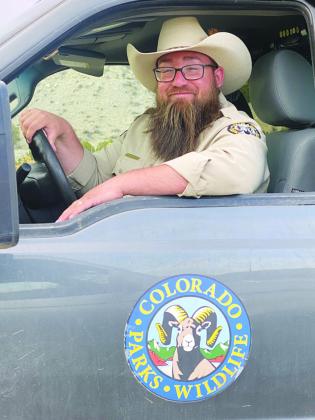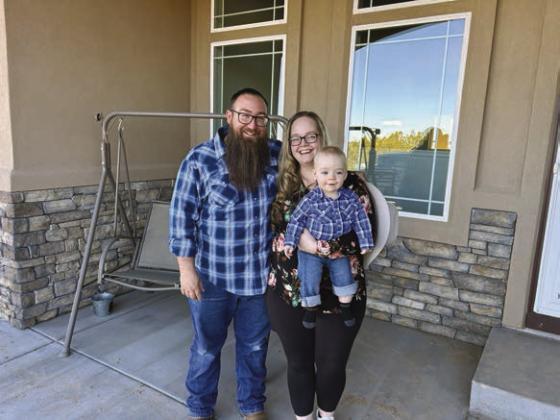District Wildlife Manager Cody Purcell has served for two years now as the Colorado Parks and Wildlife Manager for the Colorado City- Rye District. Purcell feels like he has a good feel for the district he manages and has gotten to know a lot of people in the area.
As part of his job, Purcell has law enforcement capabilities, but hopes the community has recognized his primary desire is to help people and wildlife to co-exist smoothly. We tracked Purcell down last Wednesday and spent some time finding out what things he feels need attention and what things are going well in our district.
“Local deer herd management is a constant issue,” Purcell shared. “You have both contrasts, you have people who hate the deer because of what they do to shrubs, flowers and plants; and people who love having the deer around and even spend time and money feeding them.”
Purcell plans to hold a public meeting to get a feeling from his constituents through questions, as well as polls, what the community sees as the best way to deal with the deer. The best way is NOT to feed the wild animals.
“I like to tell people that they are loving the wildlife to death,” Purcell stated. “Depending what they feed the deer they can cause acidosis.”
Acidosis in deer occurs when they ingest large quantities of readily digestible carbohydrates. This can happen with grains, but can also be caused by highly fermentable foods like beets and apples.
Acidosis is characterized by indigestion, a static rumen, dehydration, diarrhea, toxins in the blood, a lack of coordination and, ultimately, death. When deer suddenly consume a substantial amount of carbohydrates acidosis can occur within 24 hours. The rumen becomes static, and the deer may exhibit symptoms like staggering or being recumbent (lying down). Death can occur within 24-72 hours.
The underlying issue lies in the shift from a natural diet of highfiber woody browse to low-fiber, high-carb foods. Corn, wheat, and barley are common culprits for rumen acidosis. These grains are rich in starch, which serves as an energy source for the growing corn plant. However, when deer consume too much starch, it disrupts their digestive system. Deer are ruminants, and the rapid intake of high-carb foods can lead to an imbalance in their rumen microbial population. Streptococcus bacteria multiply, producing excessive lactic acid, which lowers the rumen pH and disrupts normal digestion.
Another danger, according to Purcell, is that when deer are fed at a regular spot and at a regular time, congregating as a group can spread any disease and virus that a few deer have to a large number.
Regardless, feeding the animals is against the law and can result in a ticket which carries a $139.50 price tag. If you are a hunter or fisher it can affect your licenses to do those things.
Purcell also said that he was a little surprised at the number of human-bear conflicts that occurred last year. He recognized that it had been a bad forage year for the bears but was still surprised by the fact that the bears were still out and about in late October and into November.
Purcell reported that the elk population in the area was thriving and that there were a number of quality bulls in the territory.
Another area of disappointment for Purcell was the number of complaints he had to deal with involving dogs harassing and sometimes killing wildlife. The act of chasing wildlife can be costly to the dog’s owner. The ticket is $274 and, if the animal kills a deer or other wildlife, the fine for that infraction can run $700-$1000.
Since transferring districts, he and his wife, Moriah, have built a home near Colorado City. They also welcomed their now 10--month-old son, Wyatt, to the family. Moriah continues to work remotely as a project manager for Resource West Inc. (RWI). RWI is based out of Grand Junction, Colorado and is a manufacturer and installer of enhanced evaporation equipment for industries such as leachate, mining, and oil and gas.
If you remember Purcell’s initial interview two years ago you know he likes to ride his motorcycle. That hasn’t changed. He and another wildlife officer are planning a motorcycle trip to Monument Valley. “We really enjoy the area,” opined Purcell. “I hope people who have gotten to know me, know that I am approachable. My goal isn’t to write tickets. I want to help the people in the community and the wildlife that live here co-exist and get along. I grew up around here and it’s awesome being part of the community.”



